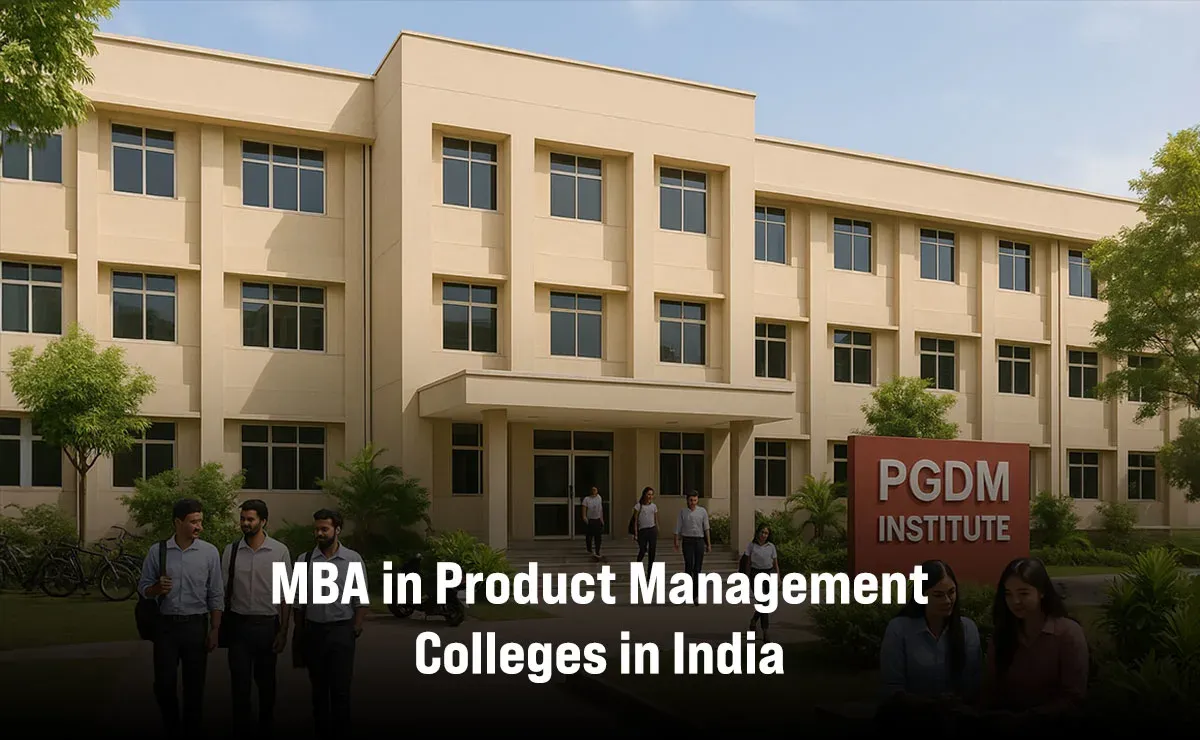MBA for Product Management

Product management is one of the most sought-after professions in today’s tech-driven world, sitting at the crossroads of business acumen, technological innovation, and user-centric experience.
An MBA for Product Management is a specialized postgraduate program that integrates core business and management principles with a sharp focus on product strategy, development, innovation, and marketing, equipping graduates with the skills to lead product lifecycles from conception to launch and beyond.
While the role doesn’t have a standard educational path, an MBA provides a structured yet versatile foundation for excelling as a product manager. This article explores if an MBA is required for a product manager while understanding its benefits for the role.
When individuals consider an MBA of Product Management, they tend to seek to know the reality of which course actually develops the practical skills required in actual product positions.
The PGP in Marketing at Altera Institute emphasizes practical learning through projects, user research, and market analysis—areas closely connected to product work. If you’re exploring alternative pathways into product or related roles, you can check out our PGP program in Marketing to see how it aligns with those skills.
What is Product Management?

Product managers shape the vision, strategy, and roadmap of products, ensuring they align with market demands while minimizing the risks associated with launching them.
They work closely with diverse teams to define product specifications, supervise the development process, and ensure successful launches. By leveraging A/B testing on minimally viable products (MVPs), they validate product hypotheses and optimize them for success.
The responsibilities of product managers can differ significantly across industries and organizations. For some, it focuses on research and development; for others, it extends to product launch and sales or ongoing maintenance. In most organizations, product management encapsulates all these stages, making it a pivotal function for success.
Key components of product management:
Research:
- Understanding the market landscape, user personas, and competitors.
- Gaining insights to shape the product's value proposition.
Strategy Development:
- Translating research into high-level strategic goals and objectives.
- Creating a product roadmap to outline priorities and timelines.
Presenting a Vision:
- Presenting the product roadmap to key stakeholders, including executives, investors, and teams.
- Fostering alignment and collaboration across departments.
Development & Execution:
- Collaborating with development, marketing, and sales teams to execute the strategic plan.
- Managing workflows to ensure timely and successful delivery.
Feedback & Iteration:
- Gathering feedback from users and analyzing performance data.
- Using insights to refine the product and inform future iterations.

Which Specialization is Best for a Product Manager MBA?
Choosing the right MBA specialization is crucial for aspiring product managers. Product management is a multifaceted role requiring a blend of skills in strategy, market research, project management, and data analysis.
Several MBA tracks are tailored to equip students with the expertise and tools necessary to thrive in this ever-evolving field. Here’s a breakdown of the top MBA specializations for product management, their strengths, and how they align with the demands of the role.
MBA in Product Management
While colleges rarely have a dedicated MBA specialization in product management, they may have short-duration special certificate courses in this specialization, comprising of online sessions, assignments, and case studies. This specialization zeroes in on key aspects of product management, including innovation strategies, market analysis, product launches, and development.
Core Features:
- Curriculum tailored to understand the entire product lifecycle.
- Real-world case studies and projects simulate actual challenges.
- Emphasis on product marketing and positioning strategies.
Advantages:
- Offers hands-on experience to apply theoretical knowledge in real-world contexts.
- Provides a competitive edge, especially for candidates with limited work experience.
- Builds a well-rounded perspective on managing collaborative teams and driving innovative products to market successfully.
MBA in Marketing
Marketing and product management share significant overlaps, making this specialization a strong base to break into this industry. An MBA in Marketing equips you with critical skills for understanding customer needs, positioning products effectively, and driving sales.
Core Features:
- Emphasis on brand management and customer-centric strategies.
- Training in market research, segmentation, and targeted advertising techniques.
- Emphasis on data-driven decision-making for strategic insights.
Advantages:
- Helps master the art of creating value driven products and positioning them in a competitive market for success.
- Gain insights into customer behavior fundamentals for creating user-focused products
- Provides strategic thinking and analytical skills critical for product lifecycle management.
MBA in Project Management
There are various colleges offering special short-duration courses in project management in India. These programs are carried out in both traditional on-campus and flexible online learning options.
For aspiring product managers with an interest in planning and execution, a specialized course in project management is highly beneficial. This specialization teaches you how to manage projects efficiently, which is a core aspect of overseeing product development and launches.
Core Features:
- Training in project planning, execution, and performance monitoring.
- Focus on financial management, risk assessment, and stakeholder communication.
- Emphasis on time management and process optimization.
Advantages:
- Enhances your ability to handle complex projects involving cross-functional teams.
- Teaches how to mitigate risks through strategies and navigate uncertainties in product development.
- The approach ensures systematic achievement of objectives within given timelines and budgets.
MBA in Data Science:
MBA in Data Science is a postgraduate program that merges business acumen with data science and technology skills. As a relatively new field of study, it integrates advanced subjects like AI, data mining, analytics, finance, and accounting.
In today’s data-driven world, an MBA in Data Science is increasingly relevant for product managers. This track merges core business knowledge with cutting-edge analytics, enabling decisions driven by accurate, data-based insights.
Core Features:
- Training in data analysis, machine learning, and predictive modeling.
- Skills for leveraging A/B testing and other experimentation techniques.
- Emphasis on customer segmentation and personalization.
Advantages:
- It prepares professionals to interpret market dynamics and customer behavior to make more effective strategic choices.
- Helps optimize product features and user experiences based on data-driven insights.
- Enables you to forecast demand and position products strategically.
MBA in Operations Management
Operations management focuses on optimizing processes to boost productivity and effectiveness across the supply chain. For those interested in the operational and logistical aspects of product management, an MBA in Operations Management offers valuable insights into supply chain processes and resource optimization.
Key Features:
- Courses on supply chain management, process optimization, and inventory control.
- The curriculum emphasizes cost-effective practices and quality control.
- Students learn to maximize operational efficiency and allocate resources effectively.
Benefits:
- It helps you streamline product development and delivery processes.
- It builds proficiency in managing the balance between supply and demand.
- Equips you to maintain high-quality standards while managing costs.
Each MBA specialization offers unique advantages, and there’s no single “best” choice for aspiring product managers. Your skills, aspirations, and professional objectives will guide you to the most suitable specialization. Research your options thoroughly, assess your strengths, and choose a specialization that aligns with your vision for success in product management.
MBA in Product Management Colleges in India

Here are some of the best colleges for an MBA in product management in India. While there aren't many MBA schools that provide a full-time degree specialization in product management, they typically provide executive courses, certificate programs, and short-term courses to meet the specific demands of their students.
These programs deliver rigorous, focused training, integrating marketing, product strategy, data analytics, and design innovation into a unified curriculum.
IIT Bombay:
IIT Bombay offers a 6-month online certification program to train professionals in product ideation, testing, development, and marketing.
Program Fee: INR 1.14 Lakh
India School of Business (ISB):
The 16-week online executive course in product management offered by ISB incorporates topics such as artificial intelligence and generative AI into its pedagogy. They also give users access to live seminars with top product managers and extensive toolkits.
Program Fee: INR 1.50 Lakh
IIM Kozhikode:
IIM Kozhikode offers a professional product management certificate, ideal for aspiring and experienced professionals. It is a 39-week program that combines rigorous coursework with practical learning experiences through assignments, case studies, and generative AI modules.
Program Fee: INR 1.84 Lakh
IIM Lucknow:
IIM Lucknow's executive program in data-driven product management is an 8 month live online course. This program addresses India’s increasing demand for skilled product managers. They offer live sessions by industry experts, guided capstone projects by IIML, and provide a comprehensive curriculum designed for success.
Program Fee: INR 2.10 Lakh
Indian School of Business (ISB):
In addition to an online executive course, ISB also offers a professional certificate in product management. It is a 28-week online course that bridges the gap between technical skills and strategic thinking, empowering students to navigate the dynamic and innovative landscape of product management.
Program Fee: INR 2.49 Lakh
The Altera Institute of Management
The Altera Institute of management offers the flagship PGP in Applied Marketing with a 100% industry-designed curriculum created by experts from top companies like Amazon, HUL, and Flipkart. With an exclusive intake of just 60 students for the Class of 2025, Altera provides a focused 1-year program tailored for those seeking a fast-tracked MBA alternative.
Program Fee: INR 13.4 Lakhs
5 Reasons Why a Product Manager Should Get an MBA
Here are a few benefits experienced by product manager MBAs for a successful career.
Expanding Your Knowledge Across Business Domains
Product managers oversee aspects like strategy, finance, marketing, sales, customer satisfaction, and product development. However, few product managers have direct experience in all these areas before stepping into the role.
An MBA fills these gaps, providing you with a comprehensive understanding of key business disciplines:
- Finance: Learn to interpret budgets and forecast profitability.
- Marketing: Understand consumer behavior and product positioning.
- Leadership: Hone skills to lead cross-functional teams effectively.
This well-rounded education ensures you’re prepared to manage not just the product but also its impact on the business.
Establishing Credibility with a Prestigious Credential
An MBA is a powerful credential that adds to your credibility, expertise, and dedication to professional growth. (In a competitive marketplace, such credentials can give candidates a distinct advantage.
- Reputation of Commitment: Completing an MBA shows that you’ve invested significant time and resources to deepen your knowledge, which hiring managers often value.
- Broad Appeal: Compared to a bachelor’s degree or a technical master’s, an MBA demonstrates your capability to tackle business challenges holistically.
- Leadership Opportunities: Many organizations, especially large corporations, regard an MBA as a prerequisite for senior roles, including product management.
While an MBA won’t grant you authority like a law or medical degree, it provides a competitive edge that reflects both ambition and a broad skillset.
Changing Perceptions About Your Background
Product managers often transition into their roles from other functions like engineering, project management, or marketing. While this background provides valuable expertise, it may also limit your prospects.
An MBA acts as a professional reset button, helping you redefine your career prospect and trajectory.
- Broader Perspective: If you were an engineer, an MBA can shift perceptions from “technical expert” to “strategic leader.”
- Strategic Focus: It emphasizes your intent to move beyond technical execution into business leadership.
- Career Pivot: For those switching industries or roles, an MBA bridges gaps in experience, presenting you as a well-rounded candidate.
By reframing your professional narrative, an MBA can open doors to roles that might otherwise seem out of reach.
Enhancing Empathy and Stakeholder Relationships
One of the most critical aspects of being a product manager is managing relationships with a variety of stakeholders, including customers, engineers, designers, marketers, and executives. Understanding their diverse perspectives is key to fostering collaboration.
An MBA enriches your ability to empathize and communicate with these stakeholders:
- Cross-Functional Awareness: Exposure to diverse business functions during your MBA helps you grasp the priorities and challenges of various teams.
- Anticipating Needs: By understanding the broader business context, you can proactively address stakeholder concerns.
- Stronger Collaboration: Knowing the language of finance, marketing, and operations enables smoother communication and alignment.
With this broader understanding, you’ll be better equipped to build trust and drive consensus, making you a more effective product manager.
Building a Robust Professional Network:
An often-underrated advantage of pursuing an MBA is the opportunity to forge lifelong professional connections. Networking is crucial for product managers, whether you’re looking for mentorship, partnerships, or career advancement.
Here’s how an MBA enhances your network:
- Classmates and Alumni: You form lifelong relationships with your college classmates and alumni, which also leads to valuable collaboration on future ventures.
- Mentorship Opportunities: Many MBA programs foster experienced product managers of the industry as mentors, who conduct one-on-one sessions with the students.
- Career Opportunities: Networking events, career fairs, and informal interactions with professionals in the industry can lead to finding cofounders, future employers, or valuable hires.
Beyond formal education, the connections you make during your MBA can play a pivotal role in shaping your product management career.
Right Time to Do an MBA for Product Manager
There is no said "right time" to pursue an MBA for a product manager. The decision to pursue an MBA hinge on factors such as career ambitions, current expertise, and financial considerations. Here are some general guidelines:
Consider an MBA if:
- You Lack a Strong Technical Background: If you don't have a strong foundation in computer science, engineering, or data science, an MBA can provide you with the necessary technical skills and business acumen to succeed in product management.
- You Want to Transition from a Non-Technical Role: If you're coming from a non-technical role, such as marketing, sales, or consulting, an MBA can help you bridge the gap and acquire the required product management skills.
- You Aim for Leadership Positions: An MBA can open doors to leadership roles, including product leadership positions. It can enhance your strategic thinking, decision-making, and communication skills, making you a more attractive candidate for senior-level positions.
- You want to Leverage a Strong Network: Elite MBA programs grant access to an extensive alumni base, seasoned professionals, and industry leaders, offering immense support in securing top roles in product management.
- You're Looking for a Career Change: If you're uncertain about your career path or looking for a significant career change, an MBA can provide you with the flexibility to explore different opportunities, including product management.
Weigh the potential benefits and costs carefully and consider your long-term career goals to get the best ROI for your MBA.
Alternatives to an MBA for Product Managers
While an MBA can provide a solid foundation for a career in product management, it is not the only route to success. Let’s explore the answer to the question: Can I become a product manager without an MBA?
Online Courses and Certifications:
There are various top colleges in India that offer online certification programs in product management. Platforms like Coursera, edX, and Udemy also offer focused programs dedicated to market research, strategies, and data analysis.
These short-term courses provide an affordable, flexible path to acquire practical skills needed for the job. Furthermore, certifications in areas such as technology tools (Jira, SQL, Tableau) and business concepts can help demonstrate proficiency in key areas essential for managing products successfully.
Relevant Degrees and Academic Pathways:
Degrees in marketing, psychology, sociology, or engineering can be highly beneficial to break into product management roles. A marketing degree, for example, provides insights into customer segmentation, branding, and product promotion, which are essential for positioning products effectively.
Degrees in psychology or sociology help understand consumer behavior, while an engineering background enables effective communication with development teams, making it easier to manage technology-driven products.
Gaining Practical Experience:
Having hands-on exposure remains one of the most valuable ways to build competency in product management. Gaining experience through current job responsibilities, freelance work, or side projects allows individuals to manage product lifecycles and lead cross-functional teams.
Gaining experience in product-related tasks, even in non-product roles, and leveraging skills from marketing, engineering, or project management backgrounds can facilitate a seamless transition into product management.
MBA in Product Management vs. Masters in Product Management
MBA in Product Management focuses primarily on developing business leadership and management capabilities while incorporating product management principles. The program emphasizes:
- Broad business acumen across marketing, finance, and operations
- Leadership and team management skills
- Strategic decision-making
- Networking opportunities
- General management expertise with product specialization
Masters in Product Management offers:
- Technical depth in product development
- Specialized product management skills
- Focus on technical organizations
- Shorter duration
- Strong emphasis on practical application through internships and capstone projects
Key Differences:
Eligibility:
- MBA: Open to candidates from all disciplines. If going for an executive MBA program, then work experience of 4-10 years is required.
- Masters: Often requires computer science/engineering background. Such a course has less emphasis on prior experience.
Career Focus:
- MBA: Primary focus towards broader management roles with emphasis on product management.
- Masters: Built for specific technical product management positions.
Program Structure:
- MBA: Comprehensive business education with product specialization
- Masters: Focused technical and product management curriculum
Availability in India:
Currently, dedicated Masters in Product Management programs are limited in India. Most product management education in India comes through:
- MBA programs with marketing specialization
- Professional certification courses provided by top colleges.
FAQ’s
Q1. Is an MBA good for a product Manager?
Ans: Yes, an MBA can be highly beneficial, especially for those aiming to transition into leadership roles or enhance their strategic and business acumen. Thriving in product management requires a combination of technical proficiency, leadership qualities, and business insight, which are areas thoroughly covered in an MBA curriculum.
Q2. Who is eligible for an MBA in product management?
Ans: An MBA in product management is open to graduates from any field, though degrees in engineering, business, or similar disciplines may offer a competitive edge.
Executive MBA certification programs prefer candidates with 2–5 years of professional experience, although some institutions admit fresh graduates as well.
Q3. What is the salary of IIM product manager MBA?
Ans: Graduates from IIMs command higher salaries due to their strong business foundation and industry connections. Such graduates, when pursuing a career in product management, can get an average salary between INR 15–30 LPA, depending on factors like previous work experience, company, location, specializations, and more.
Major technology firms like Google, Amazon, and Microsoft, alongside successful startups, provide lucrative packages that often include stock options and performance-based bonuses.
Summing Up
Product management is a highly dynamic career path that combines strategic foresight, technical aptitude, and leadership capabilities. While there is no single path to becoming a product manager, pursuing an MBA offers a comprehensive foundation, providing business acumen, networking opportunities, and leadership training.
For those seeking specialized technical roles, certifications or master’s programs in product management can also be valuable alternatives. Ultimately, the right choice depends on your background, career aspirations, and goals. Whether through formal education or practical experience, equipping yourself with the necessary skills and knowledge will position you for success in the ever-evolving field of product management.





